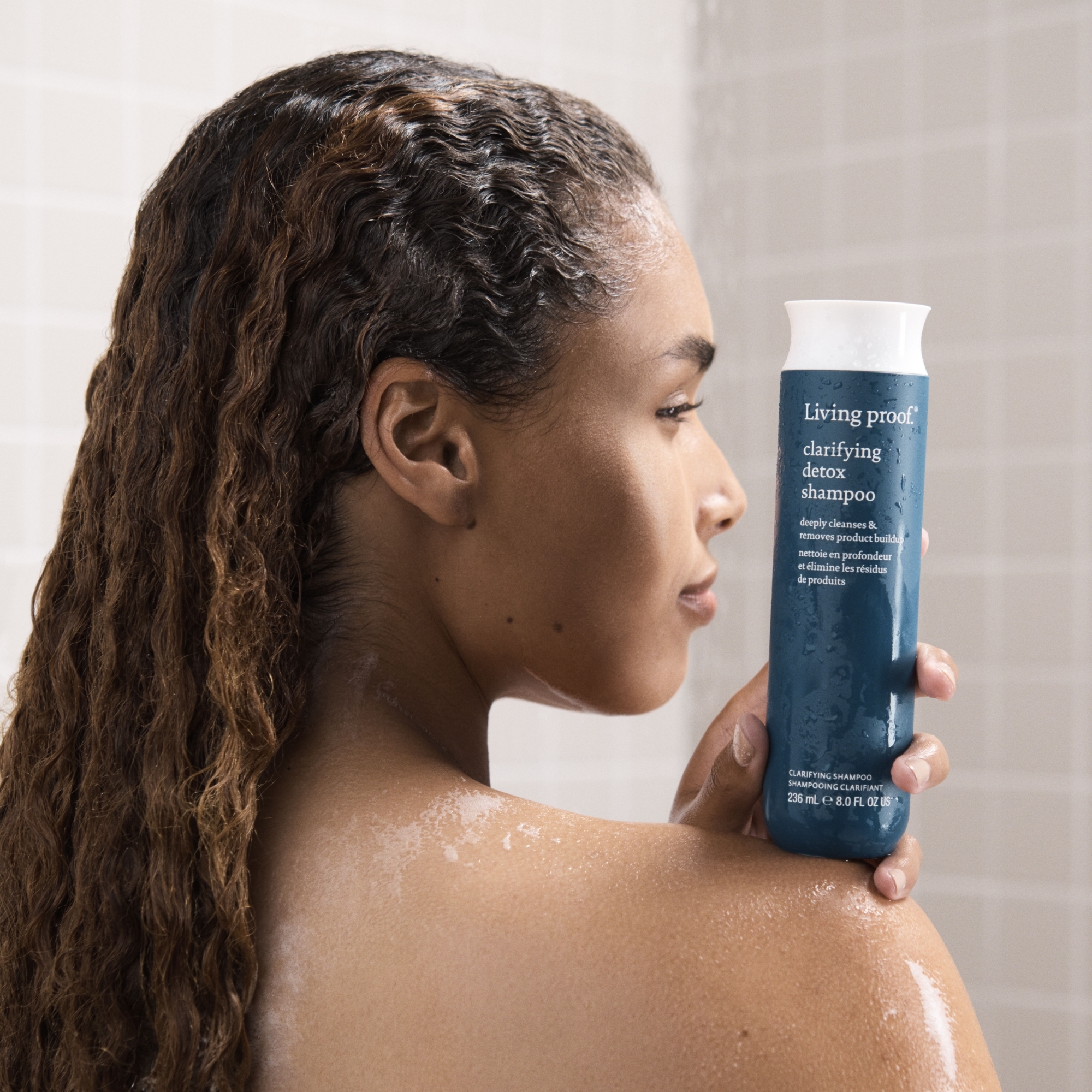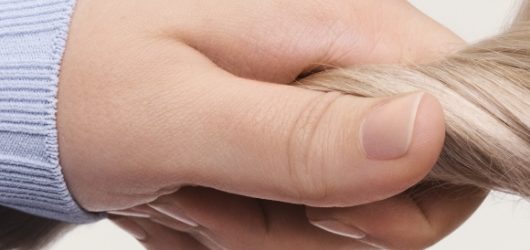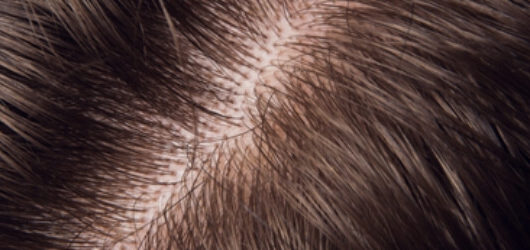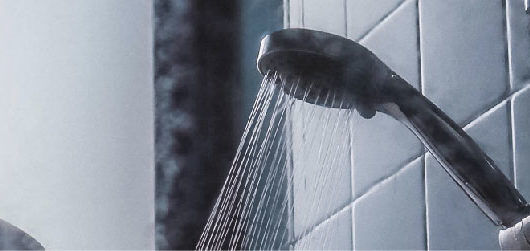
Hard Water on Hair: Effects, Signs & Solutions
If you and your hair aren’t on the same page (and haven’t been for a while), it’s time to get to the root of the issue. Whether your hair is frizzy or your waves or curls aren’t holding, it’s possible the water running through your shower is at fault.
If you’ve experienced these unforeseen hair behaviors, you may have hard water hair buildup. We’re here to help you understand the signs of hard water on hair, how hard water hair damage can unfurl, and how to remedy it safely and effectively.
What is Hard Water?
To get to the root of how hard water hair is caused, it’s essential to break down the compounds of hard water that feed the hair problems you may be seeing.
Hard water is tap water that collects mineral deposits on its journey from the water source to your home. Hard water can contain several different minerals, but two, in particular, are common: calcium and magnesium. The more calcium and magnesium are present in tap water, the “harder” the water is considered to be.
Over time, those mineral deposits can collect on shower tiles, showerheads, sink drains, dishwashers, toilet bowls, and—you guessed it—even on your hair.
Signs of Hard Water in Your Home
It might sound like hard water requires a microscope to identify—but in reality, the effects may already be obvious around you.
Here are a few signs your home may have hard water:
- Brown or reddish stains around shower drains and toilet bowls
- White, chalky residue around showerheads, shower doors, and faucets
- Water becomes cloudy or doesn’t create suds when mixed with soap
- Glass dishes come out of the dishwasher cloudy or spotted
- A film-like residue is left on your hands after washing them
If you’re still unsure, there are several at-home tests on the market that you can use to test your water for hardness. If the water in your home behaves in any of these ways and you’re experiencing prolonged issues with your hair, it may be worth the small investment to test it and know for sure.
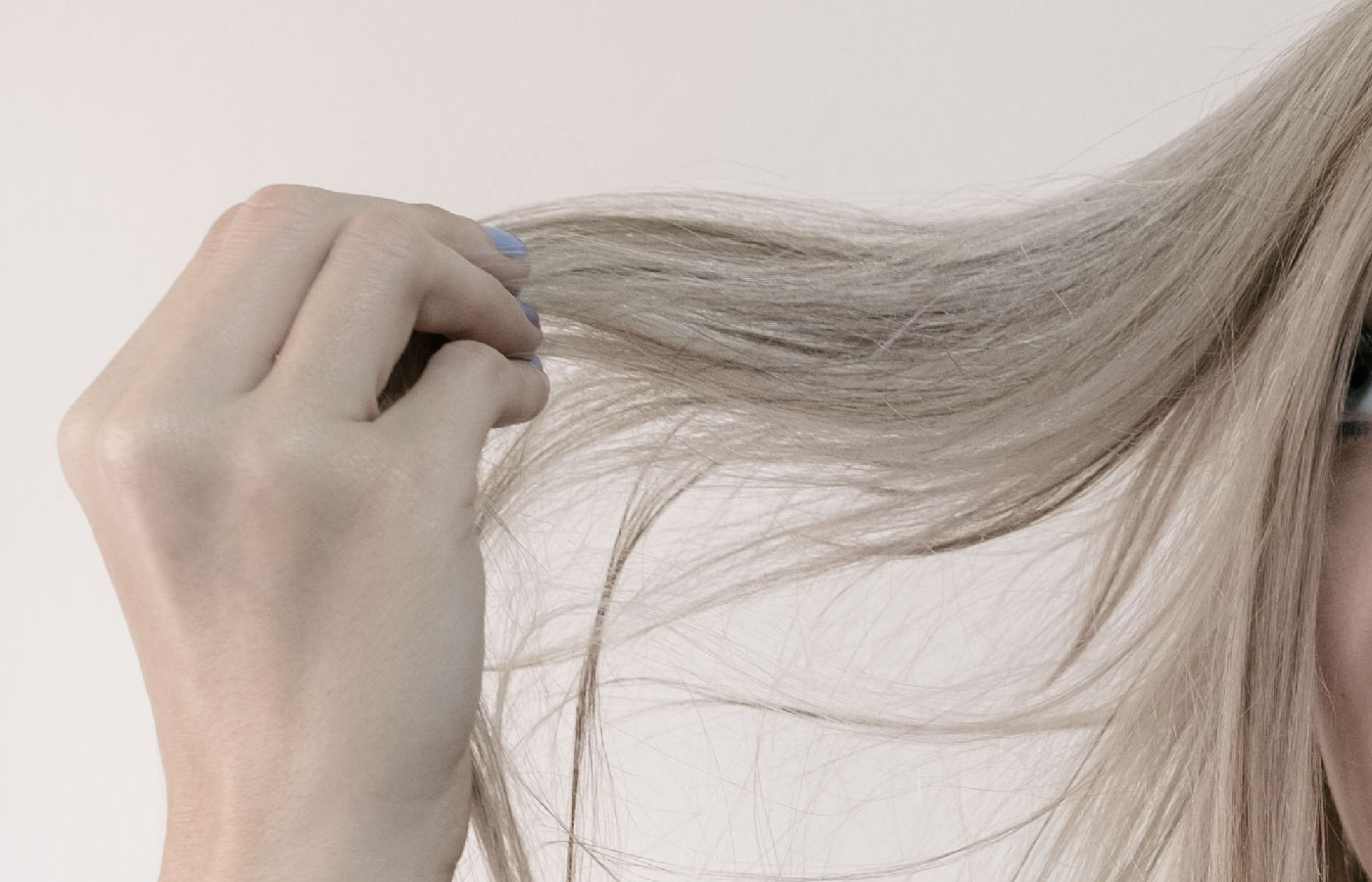
How Does Hard Water Affect Hair?
Hair is a complex structure made up of many layers. The hair cuticle is the outer layer we see, but there are many more layers of protection hard at work below the surface.
These layers do their best to protect your hair from unwanted or potentially damaging elements, but sometimes it’s inevitable. Ultimately, your hair is impacted by its surroundings.
When hair is treated with hard water over longer periods of time, those mineral deposits can accumulate, just like they might on your shower head. The mineral content is microscopic, so you won’t often be able to see it. However, in many cases, you can feel it—the result—weak, brittle, and dry hair.
Here are a few ways you might notice your hair changes when exposed to hard water:
- Hair weakening – The excess mineral buildup from hard water can affect hair in multiple ways. For starters, studies have shown that hard water can actually weaken the structure of the hair. Where hair strands were tested between hard-water treatment and distilled water (water without minerals like calcium and magnesium), the hard-water-treated hair was significantly more brittle.
- Breakage – With weakened and damaged hair, you may also experience more split ends, breakage, and resulting frizz and flyaways. Breakage may also cause an appearance of hair thinning—not ideal for that voluminous look many of us strive for.
- Cuticle buildup – The cuticle layer of the hair shaft shields hair from environmental elements, heat, chemicals, and other toxins. The problem with the calcium and magnesium deposits from hard water is that they can build up around the cuticle, disrupting its natural tendencies.
In addition, studies have found a “stiffening” effect from the mineral residue layered on top of the hair cuticle. This can affect both damaged and undamaged hair, which tells us that hair at any stage is susceptible to mineral buildup from hard water.
Signs Your Hair Might Be Affected by Hard Water
How does this all translate into the reflection in the mirror or the way your hair feels when you run your fingers through it?
Now that we understand how hard water affects your hair, let’s explore the tell-tale signs that you might be experiencing hard water hair.
#1 Your Hair Breaks More Easily
We now know that hard water can weaken hair and result in hair breakage. But it’s important to note that hair breakage is different from your hair’s natural shedding process, or hair that simply falls out.
You’ll know if the strands are breaking if you find fragments of the full strands in your hairbrush or stuck to your sweater.
#2 You Have Split Ends
Another way hair reacts to breakage caused by hard water is breaking at the ends, causing splits that can spread to the length of your strands.
Split ends often look like frayed edges of the hair, where the tip of a strand stems out into a V shape—or perhaps even a W. If you find that even a haircut doesn’t breathe fresh new life into your ends, it may be time to consider whether your water is weakening your hair.
#3 Your Tresses Tangle More Often
This sign goes back to that stiffening effect we talked about earlier. When the hair cuticle is clogged with mineral buildup, the hair loses some of its natural sheen and smooth texture.
This extra film surrounding the hair cuticle can create friction and resistance that causes the hair to tangle more easily, even when brushed regularly.
#4 Hair Styling Holds Differently
If your curls keep falling limp the second you set them, hard water could be the culprit. Many people experience mixed results when styling hair treated with hard water. Some may see that their hair fails to hold styles as well—or at all.
The overall health of your hair can also be important here. One study showed that unbleached hair actually held styles slightly better after hard water. Either way, pay attention to how your hair typically behaves after styling. Any changes could be the result of hard water.
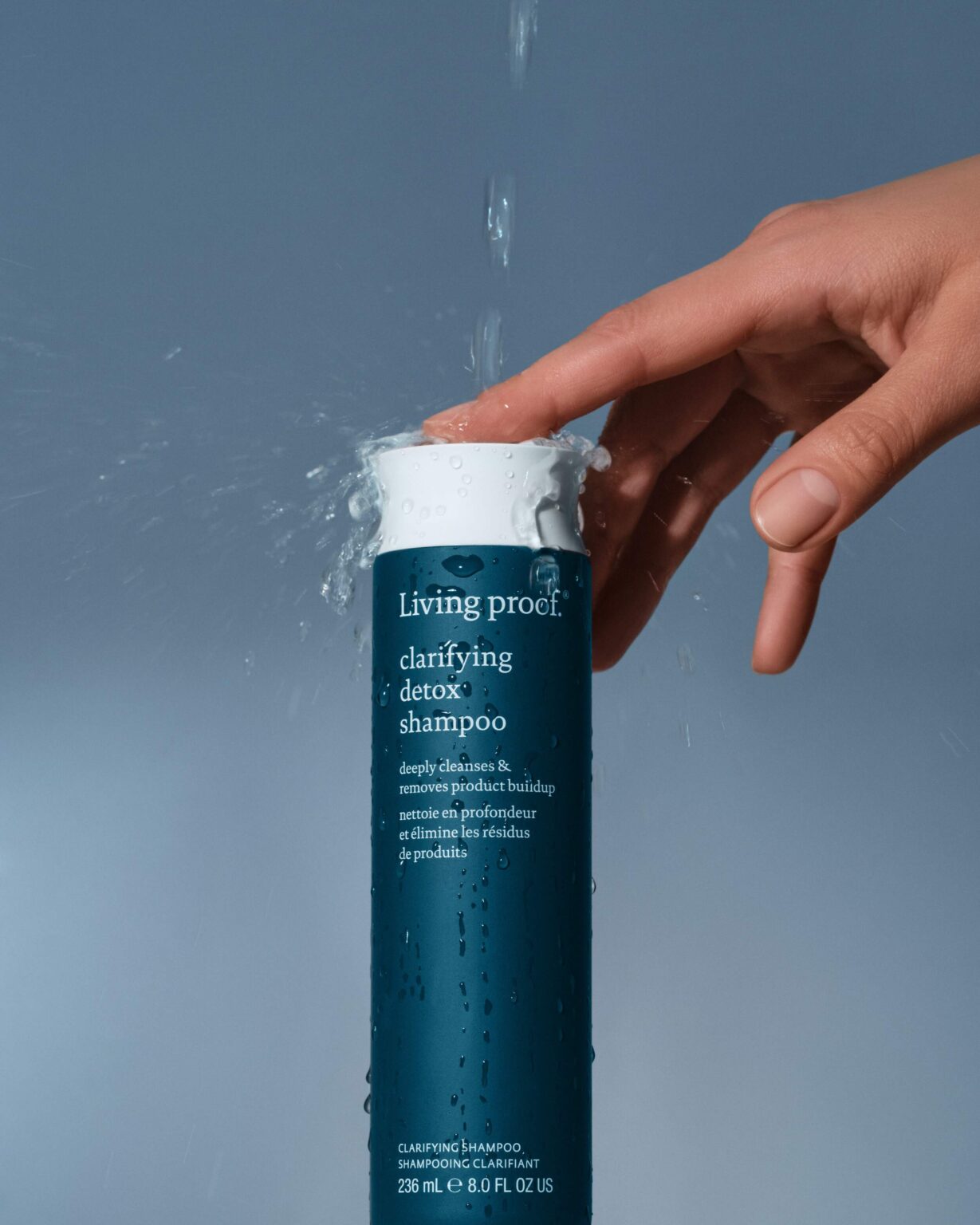 #5 Your Hair is Frizzy
#5 Your Hair is Frizzy
One study showed that under a microscope, hair treated with hard water could take on a ruffled or frizzy appearance.
Frizzy hair can be caused by a number of things, including:
- Extra humidity in the air
- Breakage
- Dryness
- Damage caused by styling or coloring
But if you’re experiencing frizz along with other symptoms on this list, it could be due to hard water.
#6 Your Locks Lack Moisture
Even if you’re using moisturizing products, the buildup caused by hard water can block moisture from penetrating through the hair cuticle. If you notice that your leave-in conditioner isn’t hydrating as much as you’d think, it may be due to the mineral buildup of hard water.
#7 Your Hair Appears Thinner
Studies have also shown that hair treated with hard water was slightly thinner than hair treated with distilled water. This effect could be another result of breakage and the weakening of hair, which you might not suffer from with soft water.
However, keep in mind that hair thinning can also be the result of hormonal changes and other health conditions. You’ll want to monitor this change along with others on this list to determine if hard water is the cause.
Solutions for Hard Water Hair
It may be overwhelming to consider all of the ways hard water can impact your locks. But not to worry—there are ways to lessen, or even eliminate, the symptoms of hard water on hair.
If hard water is making those styling sessions a drag, here are some tips to help or heal the effects of hard water on hair:
- Install a water softener – Some people opt to install a water softener in their homes when faced with the challenges of hard water. Water softeners remove the minerals like calcium and magnesium from the water. Many can be installed right into your shower, so you can concentrate that hair-loving water where it counts.
- Use detox shampoo – Detox shampoos contain chelating agents designed to strip away the chemicals, toxins, and other unwanted buildups from your hair that develop over time. You can use this type of shampoo once a week to treat hard water hair and remove buildup from hair products and pollution. Since hair chelating shampoos remove product residue, hard water buildup, and excess oil, it’s not advisable to use them more than once a week. A clarifying hair mask will also help strip away mineral deposits and residue.
Say Goodbye to Hard Water on Hair with Living Proof
Hard water hair damage can damper your readying routine and your hair. But you don’t have to let hard water ruin an amazing hair day. What you need are the right solutions—and that includes quality shampoos designed to remove mineral buildup.
At Living Proof, we believe in finding haircare solutions that work for you. Living Proof is bioengineered with powerful, effective, and safe ingredients that correct the issue at the source, without just covering it up.
We formulated our clarifying detox shampoo with a deep understanding of hard water and other hair buildups. We combined innovative compounds like chelating agents and anionic polymers to restore your hair’s clarity and shine. Get the healthy hair you deserve today.
We are the science. You are the Living Proof. Explore our hair products online today.
- U.S. Geological Survey. Hardness of Water. https://www.usgs.gov/special-topics/water-science-school/science/hardness-water
- International Journal of Trichology. Hair Cosmetics: An Overview. https://www.ncbi.nlm.nih.gov/pmc/articles/PMC4387693/
- International Journal of Dermatology. Scanning electron microscopy of hair treated in hard water. https://pubmed.ncbi.nlm.nih.gov/26711619/
- The Journal of the Pakistan Medical Association. Effect of topical application of hard water in weakening of hair in men. https://pubmed.ncbi.nlm.nih.gov/27654734/
- International Journal of Trichology. To Evaluate and Compare Changes in Baseline Strength of Hairs after Treating them with Deionized Water and Hard Water and its Role in Hair Breakage. https://pubmed.ncbi.nlm.nih.gov/30034190/
- International Journal of Cosmetic Science. The structural implications of water hardness metal uptake by human hair. https://pubmed.ncbi.nlm.nih.gov/21923661/
- International Journal of Trichology. The Shampoo pH can Affect the Hair: Myth or Reality? https://www.ncbi.nlm.nih.gov/pmc/articles/PMC4158629/

